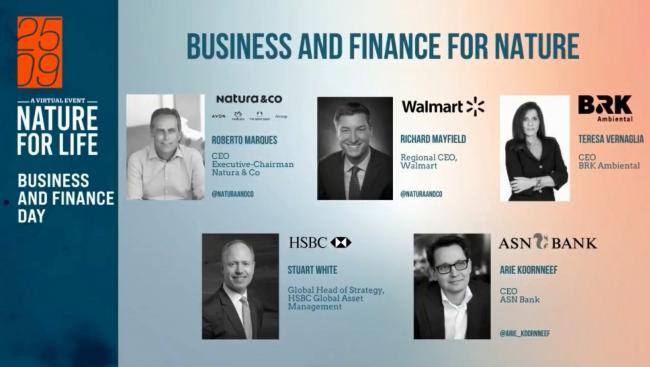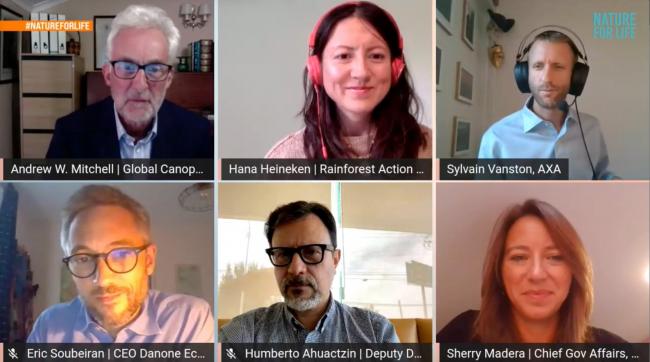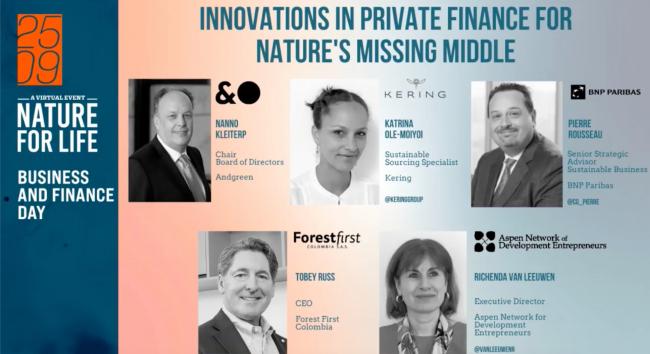Nature for Life: Business and Finance Day
Business and Finance for Nature
This session involved corporate leaders, including those from the financial sector, explaining their reasons for investing in nature as a core priority for their business, while also dealing with some of the challenges and risks that come with entering uncharted waters. Key themes to emerge during the discussions included the impact of biodiversity loss on the corporate sector, transparency and the regulatory framework, and barriers to changing the behavior of companies and financial institutions. The session ended with the launch of the Finance for Biodiversity Pledge, in which 26 financial institutions committed to protect and restore biodiversity through their finance activities and investments. On the impact of biodiversity loss on business, Akanksha Khatri, Head of the Nature Action Agenda for the World Economic Forum’s Platform for Global Public Goods, said biodiversity loss and ecosystem collapse was ranked by leaders in business, government and civil society as one of the top five threats humanity will face in the next 10 years. This view was endorsed in a video comprising a series of statements from some of the 560 CEOs from global businesses and companies calling on governments to realize that “nature is everyone’s business.”
Roberto Marques, CEO and Executive-Chairman, Natura & Co, described the financial and social rewards of working with local communities, saying they are the guardians of nature and their co-existence with nature is crucial. Teresa Vernaglia, CEO, BRK Ambiental, a private Brazilian sanitation company, explained that their core business depends on water, which directly impacts the sustainability of their business. She described the 50% decrease in profit during a 2014 drought and how this led to innovative new water treatment technologies that reduced water loss by over 9 billion liters per year, the equivalent of water use by a city of 200,000 people.
Richard Mayfield, CEO, Walmart Mexico, Central America, Canada and the UK, described the significant changes in Walmart’s business model, which he said is about putting nature and humanity at the core of their priorities. He detailed the impact Hurricane Katrina had on turning the business model around.
Other comments on biodiversity loss included:
- the need for the entire financial sector to come together to magnify their impact in reducing biodiversity loss;
- the potential for the new Finance for Biodiversity Pledge to reverse the loss of natural resources during the coming decade; and
- the fact that financial returns do not matter if biodiversity loss has resulted in the loss of quality of life for clients.
On transparency and regulatory frameworks in the financial sector, Stuart White, Global Head of Strategy and CEO, HSBC Global Asset Management, stressed the importance of screening the investment portfolios of businesses and increasingly looking at sustainable development initiatives that benefit from pension and other fund investments, while changing the perspective that natural resources are an externality instead of an asset class.
Discussing the barriers to scaling up and accelerating actions, Stuart White said nature was always regarded as a free resource that is now at a tipping point that can no longer be replenished. He said this realization means a rapid paradigm shift is needed in the financial sector. Other barriers that were highlighted included: re-evaluating the way we measure nature; educating financial leadership to have a better understanding of the risks of biodiversity loss; and the need for businesses to fully understand how reliant they are on nature.
Closing the session, Arie Koornneef, CEO, ASN Bank, announced the Finance for Biodiversity Pledge. Established by a group of 26 financial institutions, it commits these companies to protect and restore biodiversity through their financial activities and investments in the run-up to the Conference of the Parties (COP 15) to the Convention on Biological Diversity in May 2021.
Transforming Finance for Nature
This session aimed to strengthen the momentum building towards a new initiative to be formally launched in 2021: the Taskforce on Nature-related Financial Disclosures (TNFD), a collaborative enterprise between dozens of financial institutions, private companies, governments, and think tanks. Key themes discussed during this session included the need to clearly understand the business risks, dependencies and impacts on nature, and the role of clear reporting, metrics, and data in relation to financial institutions.
On the critical role of financial institutions in protecting nature, Midori Paxton, Head of Ecosystems and Biodiversity, UNDP, said “our behaviour will define how nature will pay us back.” Margaret Kuhlow, Acting Global Conservation Director and Global Finance Practice Leader, WWF, cited the recent Living Planet Index report showing the population sizes of mammals, birds, fish, amphibians and reptiles to have declined by 68% since 1970. She called for an improved understanding of the private sector’s dependence and impact on nature.
Moderator Andrew Mitchell, Founder and Senior Adviser, Natural Capital Finance Alliance and Global Canopy, related his discovery that he needed to start “hugging bankers and financiers” instead of trees to start making an impact, noting that half of the world’s population relies on nature for their daily livelihood.
Bérangére Abba, Secretary of State, Ministry for Ecological Transition, France, stressed the urgent need for action and financing biodiversity, and highlighted the important part the private sector can play.
On financial disclosure and reporting, Secretary of State Abba said it will reduce harmful flows of money that cause biodiversity loss, and encouraged the emergence of biodiversity finance. She said it was essential the financial sector standardize the risks associated with capital flows linked to natural resource use.
On risk and uncertainty with respect to humanity’s engagement with nature, Partha Dasgupta, Lead Reviewer of the Dasgupta Review on the Economics of Biodiversity and Professor Emeritus at the University of Cambridge, cautioned that ecosystems can move into tipping points and descend into a new state, which is sometimes irreversible, leading to regime shifts and related risks consequences that have significant policy implications.
In terms of the rules guiding financial systems and how nature has moved onto the regulatory agenda, José Antonio Quesada, Vice President, Regulatory Policy, National Banking and Securities Commission of Mexico (CNBV), described a roadmap of actions for the next decade on how financial institutions should protect nature and biodiversity loss. Sherry Madera, Chief Industry and Government Affairs Officer, Refinitiv, one of the world’s largest data providers for the financial system, emphasized the need for disclosure on impacts in the natural domain, taking actions to halt green crime, and considering what data would be required for infrastructure and investment.
On the private sector’s ecological footprint, Sylvain Vanston, Head of Climate and Biodiversity, Axa Group, lamented that nature-related risk and damage usually carries no immediate cost to companies and is not visible in the actual product, thus leading to the tragedy of the commons. Eric Soubeiran, Vice-President for Nature and Water Cycle at Danone, and CEO of the Danone Ecosystem Fund, observed that circularity reduces risk exposure, and said externalities are increasingly tangible. He urged an improvement of business models to avoid the tragedy of the commons.
Hana Heineken, Senior Campaigner, Responsible Finance, Rainforest Action Network, presented the impacts of investments by global banks and investors, saying none declare their role in nature depletion. She supported the Taskforce on Nature-related Financial Disclosures (TNFD) as a necessary tool to expose unsustainable investments, and urged far more transparency from banks and investors about the risks in their portfolios.
In closing, Elizabeth Maruma Mrema, Executive Secretary, Convention on Biological Diversity (CBD), drew attention to recent reports about the continued loss of biodiversity and its impact on the world’s economy suggesting that if strong steps are taken by all stakeholders, the situation can still be reversed. She expressed hope that the potential for banks, insurers and investors to minimize their biodiversity-related financial risks will increase opportunities to invest in biodiversity through the development of financial instruments such as green bonds and blended finance.
Innovations in Private Finance for Nature’s Missing Middle
This session explored the challenges and opportunities for financing small and medium-sized enterprises (SMEs) within the broad scope of nature-based solutions, and showcased examples of specific nature-based projects that have been financed through pioneering risk-mitigating instruments. Participants reviewed the main opportunities and challenges in financing the “missing middle” of nature-based businesses, including new markets, new instruments and new capital for green circular and inclusive growth. Key topics to emerge during the discussions included experiences in raising capital, financial tools for non-bankable projects, public-private cooperation on financing, and lessons from working with SMEs.
In his opening remarks, Nigel Purvis, President and CEO, Climate Advisors, highlighted that natural climate solutions are facing a global challenge in terms of the gap in growing demand for financial support and the businesses and products on the ground that can actually deliver positive impacts at the scale and scope necessary to achieve biodiversity, climate and sustainable development goals. He said this is what is meant by the “missing middle,” referring to the fact that there is plenty of demand for natural and climate solutions and an abundance of potential supply, and yet the financing for action remains a challenge.
Host and moderator, Helen Edmundson, Head of International Strategy and Engagement, Department for Environment, Food and Rural Affairs, UK, referred to the opportunities and challenges of SMEs that invest in nature and nature-based solutions, delivering benefits that address three critical needs, including: the need for access to economic opportunities to support livelihoods and jobs; the need to find solutions to reverse catastrophic biodiversity loss; and the need for solutions to combat climate change.
Participants then shared their experiences in raising capital for their respective ventures, with Tobey Russ, CEO, Forest First Colombia, detailing the history of his company looking for large-scale sustainable forestry projects around the equator over Africa, Asia and South America. He noted the importance of projects with the potential to have transformational impacts in developing countries, particularly in the equatorial countries. Katrina Ole-Moiyoi, Sustainable Sourcing Specialist for Kering, a luxury fashion group, said her company became interested in nature-based solutions because the world is not moving fast enough in responding to the environmental crisis. On the reason for investing in nature, she said it protects the source of their income as all of their products have their origin in nature, referring to the example of mohair products harvested from goats in Mongolia.
Elaborating on a range of examples of financial tools for non-bankable projects, Pierre Rousseau, Senior Strategic Advisor, Sustainable Business at BNP Paribas, explained how banks have to reinvent themselves to meet the new challenges, including through transforming to green economies, meeting collaborators’ search for purpose and investors’ search for impact, and pressures from regulators and civil society. He described different approaches and examples of collaborative banking in action with blended finance approaches, including the Global Fund for Coral Reefs, the Tropical Landscape Finance Facility and Sub national Climate Fund.
On public and private finance cooperation, Nanno Kleiterp, Chairman, AndGreen Fund, described the fund’s origin and aim of restoring tropical forests, saying the fund is only implemented where the government has a clear landscape protection plan and includes collaboration between the private and public sector. As examples, he mentioned tropical forestry projects that include small farmers in Indonesia and Brazil. He emphasized the importance of tracking the performance of the smallholders to ensure success.
On lessons of working with SMEs, Kleiterp noted the initial lack of information and historic data, which require the support of an aggregator such as a bank or a cooperative, and people who clearly understand what an entrepreneur should do.
On the key enabling policies and role of governments, Richenda Van Leeuwen, Executive Director, Aspen Network for Development Entrepreneurs, noted the need for market development engagement and research that requires financial support outside of the business, saying this is one area where sustained support from government can make a significant difference.
During the ensuing discussion, participants commented on how the COVID-19 pandemic has impacted investments in nature-based SMEs, with Tobey Russ noting that the stringent measures to halt the spread of the disease had curtailed operations significantly. Katrina Ole-Moiyoi took a more positive view, saying she had been heartened by the amount of projects that have funded SMEs working at the forefront of the food and manufacturing sectors. Pierre Rousseau mentioned the negative impact COVID-19 had on the livelihoods of the mid-size smallholder farmers and fisheries SMEs, saying they need support more than ever. Tobey Russ noted the difficulties answering questions about the impact a project might have, saying it often takes years to submit enough data and show sufficient evidence. Richenda Van Leeuwen stressed the need to support women entrepreneurs in particular.


